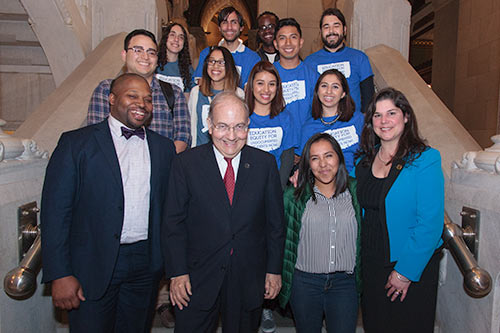Innovation & Entrepreneurship Legislation Wins Unanimous Committee Vote
Senate Bill 1 will foster new vitality and growth in Connecticut’s economy, support startup companies in all sectors
In a first step toward a new direction in economic development for the State of Connecticut, legislation aimed at fostering the growth of new, innovative Connecticut businesses won bipartisan, unanimous approval Thursday in the General Assembly’s Finance, Revenue & Bonding Committee.
In an effort to better promote new business formation and growth across all sectors of the state’s economy, the bill calls for a reorganization of the state’s economic development resources to support startup companies and foster a wide-ranging supportive ecosystem in which new ventures can thrive.
“Connecticut needs an enhanced commitment to economic development, one which focuses on the cultivation of a supportive environment for new Connecticut startup businesses, as much as it continues to nurture existing companies and attract others from out-of-state,” said Senate President Martin M. Looney (D-New Haven). “Connecticut has a long and proud tradition of innovation. This legislation will help ensure that every Connecticut innovator with a promising idea has the opportunity and the resources necessary for success. It will also help provide a multitude of new business and employment opportunities for our state’s young people, which is essential to our economic future.”
“Economic policy that encourages and incentivizes new startup companies to germinate right here in Connecticut must be an integral part of our growth strategy, and this bipartisan legislation is an important part of the equation,” said Speaker of the House Brendan Sharkey (D-Hamden). “Tying in our colleges, universities, and technical schools with new businesses is also critical, so our young people will have more economic opportunity and want to stay in Connecticut and contribute to our communities.”
“Connecticut has all the ingredients necessary to be a strong leader in innovation and entrepreneurship, not only within the United States but globally. This bill will focus resources to create the environment necessary for innovators, entrepreneurs and new Connecticut businesses to thrive,” said Senator John Fonfara (D-Hartford), Finance Committee co-chairman.
“Far too often, Connecticut has just viewed economic development and job growth by ’check writing’. This creates synergy and optimism for new ideas and job growth clustered around innovative districts—it is a game changer,” said Rep. Jeffery Berger (D-Waterbury), Finance Committee co-chairman. “As House Chair of the Finance Committee, I am very pleased to have played a major role in this legislation. I look forward to seeing the positive progress of this integrated approach to fostering business in the state”
“There’s no greater priority for Connecticut than growing and retaining high-quality jobs,” said Senate Majority leader Bob Duff (D-Norwalk). “This bill leverages Connecticut’s economic advantages and will make it easier for entrepreneurs to create jobs and establish high growth businesses.”
The legislation, Senate Bill 1, aims at the creation of a comprehensive ecosystem supportive of Connecticut startup businesses of all kinds, and across all sectors. The bill’s initiatives seek to harness Connecticut’s considerable economic strengths—a highly educated and productive workforce, top-tier universities, existing businesses and other institutions—and leverage them for the formation and growth of new companies. Its measures include:
Focusing the State as Partner
- Creates ImpaCT, a new entity within Connecticut Innovations charged with fostering startups and developing the state’s entrepreneurship community.
- Establishes a private-sector panel of repeat-entrepreneurs and business experts to lead ImpaCT.
- Maintains and increases state support through Connecticut Innovations for investment in early stage and high-growth companies.
Innovation Districts & Innovation Places
- Establishes an open competition, judged by ImpaCT, to designate “Innovation Districts”: dense neighborhoods where innovators and entrepreneurs will work, live and play in close proximity.
- Leverages the presence of key anchor institutions like universities, hospitals and major businesses to support neighborhood entrepreneurs in these districts.
- Provides state support to winning Innovation Districts in support of their plans for development and growth.
- The Brookings Institute has documented the success achieved through innovation districts in Boston, Pittsburg, St. Louis, Barcelona, Spain and beyond.
- Also makes funds available for “Innovation Places”—Innovation Districts on a smaller scale.
Cultivating Private Investors & Supporting Startups
- Leverages private venture capital through “StartupCT” to establish six competitive new funds to invest in pre-seed and early-stage companies.
- Extends the successful Angel Investor Tax Credit program for another three years.
- Introduces “AccelerateCT” to support business accelerators, which take startup businesses with growth potential and provide them space, business support services and advice, access to capital equipment and other resources.
Engaging Our Colleges & Universities
- Provides $1 million in support of new entrepreneur-oriented staff and programming at UConn, provided that the UConn Foundation raises $1 million in matching funds.
- Coordinates existing resources at Connecticut’s public and private colleges, and establishes new resources to provide services in support of entrepreneurs at all of the state’s higher education institutions, including technology transfer and more.
Job Skills & Training Opportunities
- Creates the Innovation Talent Fund in support of programming which increases tech talent in the state, with an initial focus on software developers.
- Expands existing night classes at CT tech schools to help both students and non-students study the trades and learn other valuable work skills.
In recognition of a difficult fiscal climate, Senate Bill 1 is funded entirely through reallocation of existing state resources, with the sole exception of the $3 million per year Angel Investor Tax Credit.


